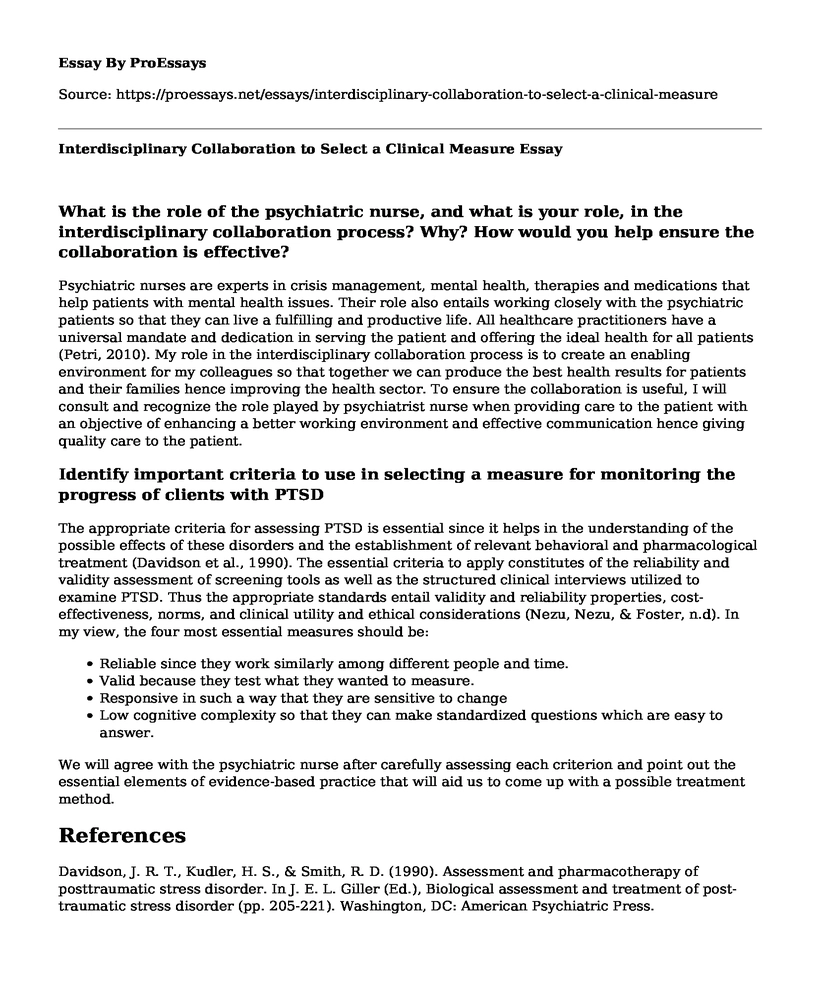What is the role of the psychiatric nurse, and what is your role, in the interdisciplinary collaboration process? Why? How would you help ensure the collaboration is effective?
Psychiatric nurses are experts in crisis management, mental health, therapies and medications that help patients with mental health issues. Their role also entails working closely with the psychiatric patients so that they can live a fulfilling and productive life. All healthcare practitioners have a universal mandate and dedication in serving the patient and offering the ideal health for all patients (Petri, 2010). My role in the interdisciplinary collaboration process is to create an enabling environment for my colleagues so that together we can produce the best health results for patients and their families hence improving the health sector. To ensure the collaboration is useful, I will consult and recognize the role played by psychiatrist nurse when providing care to the patient with an objective of enhancing a better working environment and effective communication hence giving quality care to the patient.
Identify important criteria to use in selecting a measure for monitoring the progress of clients with PTSD
The appropriate criteria for assessing PTSD is essential since it helps in the understanding of the possible effects of these disorders and the establishment of relevant behavioral and pharmacological treatment (Davidson et al., 1990). The essential criteria to apply constitutes of the reliability and validity assessment of screening tools as well as the structured clinical interviews utilized to examine PTSD. Thus the appropriate standards entail validity and reliability properties, cost-effectiveness, norms, and clinical utility and ethical considerations (Nezu, Nezu, & Foster, n.d). In my view, the four most essential measures should be:
- Reliable since they work similarly among different people and time.
- Valid because they test what they wanted to measure.
- Responsive in such a way that they are sensitive to change
- Low cognitive complexity so that they can make standardized questions which are easy to answer.
We will agree with the psychiatric nurse after carefully assessing each criterion and point out the essential elements of evidence-based practice that will aid us to come up with a possible treatment method.
References
Davidson, J. R. T., Kudler, H. S., & Smith, R. D. (1990). Assessment and pharmacotherapy of posttraumatic stress disorder. In J. E. L. Giller (Ed.), Biological assessment and treatment of post-traumatic stress disorder (pp. 205-221). Washington, DC: American Psychiatric Press.
Nezu, C. M., Nezu, A. M., & Foster, S. L. (n.d.). A 10-step Guide to Selecting Assessment Measures in Clinical and Research Settings. AABT Clinical Assessment Series Practitioner's Guide to Empirically Based Measures of Depression, 17-24. Doi: 10.1007/0-306-47629-0_3.
Petri, L. (2010). Concept Analysis of Interdisciplinary Collaboration. Nursing Forum, 45(2), 73-82. doi:10.1111/j.1744-6198.2010.00167.x
Cite this page
Interdisciplinary Collaboration to Select a Clinical Measure. (2022, Jun 20). Retrieved from https://proessays.net/essays/interdisciplinary-collaboration-to-select-a-clinical-measure
If you are the original author of this essay and no longer wish to have it published on the ProEssays website, please click below to request its removal:
- Correction Systems Essay Example
- Rhetorical Analysis Essay: Is It Necessary to Have Health Insurance
- Essay on Cultural Empowerment of Children with Obesity
- Licensed Dietitians in South Carolina: Understanding the Dietetics Licensure Act - Free Essay
- Free Report Example on Bergerac System
- Paper Exploring Recidivism Risk Assessment and Interventions: Key Insights from Recent Research
- Essay Sample on San Francisco's Queen of Vice







